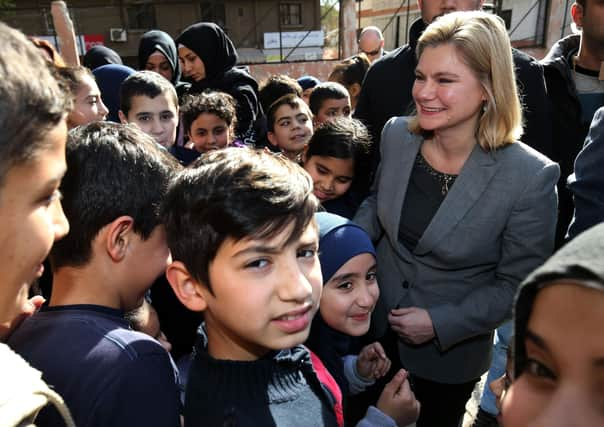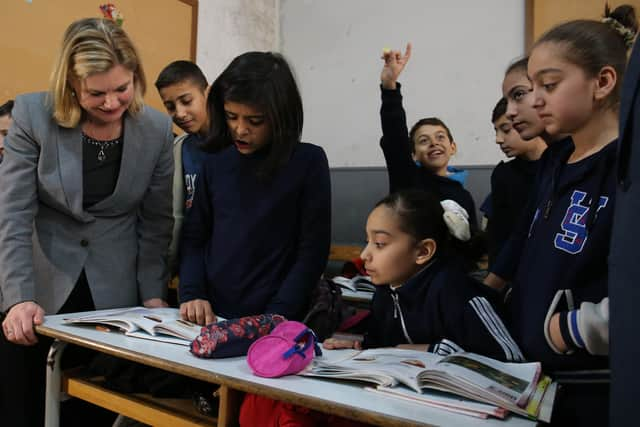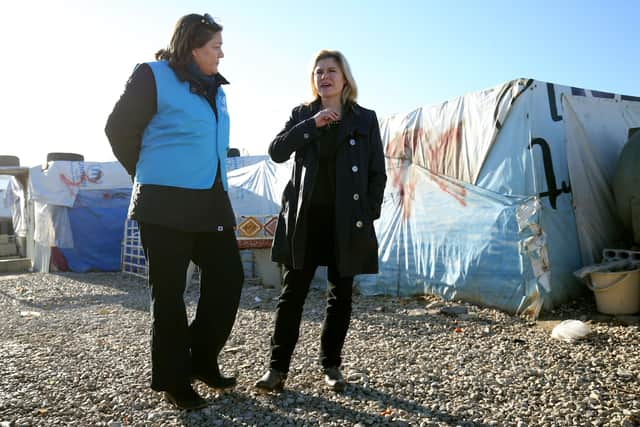How refugee camp visit revealed education’s global importance – Justine Greening


It’s hard to convey the horror of what many had been through. But it was meeting their children that had the most profound impact on me.
Virtually overnight they had lost all access to any sort of organised education, missing something that had been transformational in my own life.
Advertisement
Hide AdAdvertisement
Hide AdLike few other issues, it underlined to me how long term the perspective needs to be for shaping any country’s future.


Whatever the wider uncertainties around their young futures, one thing was for sure – the refugee children I met would grow up to become the future Syria.
The international community faced a stark choice – did we want them to grow up as adults with knowledge and skills and the capacity to rebuild their country?
Or to be uneducated, illiterate and without hope, cheated of a future because of a civil war that was no fault of their own, with all the wider instability that risked bringing?
Advertisement
Hide AdAdvertisement
Hide AdI turned our UK and international focus to do more to help these children get their learning back on track as much as possible, even in spite of the huge challenges we would face. It wasn’t just best for them it was best for a wider world too.


I’ve never forgotten that lesson of thinking for the long term. The experience also underlined another point – prevention is better than cure – and it’s thinking longer-term that puts us in a position to tackle problems before they become entrenched.
Those terrible challenges that Syrian refugee children faced are very different to the ones that we face today, but years later, Covid-19 has brought home these key lessons to our own country.
We’ve seen a Covid-19 vaccination programme that embodies an approach of prevention being better than cure. The millions of vaccinations already given have saved lives and crucially prevented the NHS from being overwhelmed.
Advertisement
Hide AdAdvertisement
Hide AdThe Chancellor has also taken a similar approach on the economy through the furlough scheme. It, too, is based on thinking ahead and the understanding that prevention is better than cure.
Rishi Sunak has chosen to invest in protecting existing businesses and jobs because it makes better sense than allowing the alternative of far worse economic disruption.
It’s how we can best avoid the scarring that long-term unemployment brings. Now we must apply the same longer-term approach when it comes to our children, whether you term it “levelling up”, “build back better”, or anything else.
We have a moral obligation to our children to provide them with the basis for fulfillment and success in their lives. And for the wider country, it’s surely a far smarter use of the nation’s talent to have our young people grow up to be skilled, educated and connected to opportunity to make the most of their potential for themselves and our country, rather than leaving their talent buried, never discovered, with lives and careers unexplored.
Advertisement
Hide AdAdvertisement
Hide AdAnd a strategy of prevention rather than cure is a smarter use of taxpayer money.
Vaccinations are more cost-effective than an overwhelmed NHS. People staying in jobs is more cost-effective than an economy with mass unemployment.
And in the same way, investing upfront in our children and young people, to develop and use the nation’s talent is better too. Unlocking the ideas and energy of all of our people is how we can succeed.
It means that investment today to deliver ‘levelling up’ – whether from government or from the private sector – is how we repair, for the long term, the huge hole in public finances that Covid-19 has wrought. Creating better lives and better outcomes is the only way we can achieve better public finances.
Advertisement
Hide AdAdvertisement
Hide AdAnd there are new solutions tried and tested on the ground that we can draw on. The response to Covid-19 has driven huge innovation and new ways of thinking – online learning and skills development, and e-work experience and careers advice has widened access beyond what was ever possible before.
Many of our schools have worked through what their best approaches now are to children learning remotely and away from the classroom. It could prove crucial as a strategy for helping close underlying education inequality gaps.
As we look towards the end of this terrible pandemic, we can combine this fresh thinking with a renewed level of ambition to be a generation that thinks long term on levelling up, alongside tackling climate change. We can use this moment to finally change Britain forever and for the better.
That’s the ambition I hope to see in the Prime Minister’s speech next week, as he sets out a course for our children getting back into school and a wider opening up of life.
Advertisement
Hide AdAdvertisement
Hide AdAnd it’s the ambition I hope to see echoed the following week in the Chancellor’s Budget. With ambition comes achievement.
We can deliver a fairer, stronger country post-Covid-19. Now is the time to aim higher for our younger generation, our future Britain.
Justine Greening is a former Cabinet minister. She was born in Rotherham.
Support The Yorkshire Post and become a subscriber today. Your subscription will help us to continue to bring quality news to the people of Yorkshire. In return, you’ll see fewer ads on site, get free access to our app and receive exclusive members-only offers. Click here to subscribe.
Comment Guidelines
National World encourages reader discussion on our stories. User feedback, insights and back-and-forth exchanges add a rich layer of context to reporting. Please review our Community Guidelines before commenting.